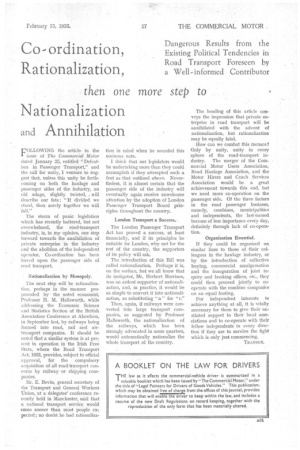Co-ordination, Rationalization,
Page 47

If you've noticed an error in this article please click here to report it so we can fix it.
Dangerous Results from the Existing Political Tendencies in Road Transport Foreseen by a Well-informed Contributor
then one more step to
Nationalization
and Annihilation
L'OLLOWING the article in the I issue of The Commercial Motor dated January 25, entitled "Defeatism in Passenger Transport," and the call for unity, I venture to suggest that, unless this unity be forthcoming ou both the haulage and passenger sides of the industry, an old adage, slightly twisted„ will describe our fate: "If divided we tancl, then surely together we will fall," The storm of panic legislation which has recently battered, but not overwhelmed; the road-transport industry, is, in my opinion, one step forward towards the annihilation of private enterprise in the industry and the abolition of the independent operator: Co-ordination has been forced upon the passenger side of road transport.
Rationalization by Monopoly.
The next step will be rationalization, perhaps in the manner propounded by the noted economist, Professor H. M. Hallsworth, while addressing the Economic Science and Statistics Section of the British Association Conference at Aberdeen, in September last, by railways being formed into road, rail and airtransport companies. It should be noted that a similar system is at present in operation in the Irish Free State, where the Road Transport Act, 1933, provides, subject to official approval, for the compulsory acquisition of all road-transport concerns by railway or shipping companies.
Mr. E. Bevin; general secretary of the Transport and General Workers Union, at a delegates' conference recently held in Manchester, said that a national transport service would come sooner than most people ex-, pected; no doubt he had rationaliza
tion in mind when he sounded this ominous note.
I think that our legislators would be undertaking more than they could accomplish if they attempted such a feat as that outlined above. Nevertheless, it is almost certain that the passenger side of the industry will eventually again receive unwelcome attention by the adoption of London Passenger Transport Board principles throughout the country.
London Transport a Success.
The London Passenger Transport Act has proved a success, at least financially, and if its principles be suitable for London, why not for the rest of the country, the supporters of its policy will ask.
The introduction of this Bill was called rationalization. Perhaps it is, on the surface, but we all know that its instigator, Mr. Herbert Morrison, was an ardent supporter of nationalization, and, in practice, it would be as simple to convert it into nationalization, as substituting "n" for "r."
Then, again, if railways were converted into large transport companies, as suggested by Professor Hallsworth, the nationalization of the railways, which has been. strongly advocated in some quarters, would automatically nationalize the whole transport of the country. The heading of this article conveys the impression that private enterprise in road transport will be annihilated with the advent of nationalization, but rationalization may be equally fatal.
How can we combat this menace? Only by unity, unity in every sphere of the road-transport industry. The merger of the Commercial Motor Users Association, Road Haulage Association, and the Motor Hirers and Coach Services Association would be a great achievement towards this end, but we need more co-operation on the passenger side. Of the three factors in the road passenger business, namely, combines, municipalities and independents, the last-named become of less importance every day, definitely through lack of co-operation.
Organization Essential.
If they could be organized on similar lines to those of their colleagues in the haulage industry, or by the introduction of collective buying, commercial amalgamation and the inauguration of joint inquiry and booking offices, etc., they could then, proceed jointly to cooperate with the combine companies on an equal footing.
For independent interests to achieve anything at all, it is vitally necessary for them to give their unstinted support to their local associations and to co-operate with their fellow independents in every direction if they are to survive the fight which is only just commencing.
TRANSEX.




























































































